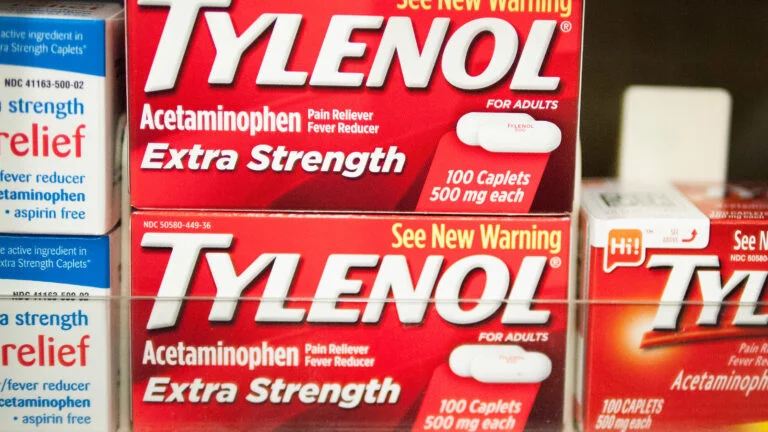
“There is no strong link between Tylenol and autism.”
On Monday, President Donald Trump suggested that pregnant women experiencing pain or fever should “tough it out” rather than using acetaminophen, commonly known as Tylenol, a painkiller doctors typically deem safe for short-term use during pregnancy.
Speaking from the White House with health agency leaders at his side, Trump recommended that pregnant women avoid the medication, citing a controversial claim about its potential link to autism.
“Effectively immediately the FDA will be notifying physicians that the use of … acetaminophen, which is basically, commonly known as Tylenol, during pregnancy can be associated with a very increased risk of autism,” Trump said. “So taking Tylenol is not good.”
The president’s comments came after a recent study by researchers from Massachusetts and New York analyzed 46 prior studies. The research raised alarms about a potential connection between acetaminophen use during pregnancy and neurodevelopmental issues, including autism and ADHD.
“Further research is needed to confirm the association and determine causality, but based on existing evidence, I believe that caution about acetaminophen use during pregnancy – especially heavy or prolonged use – is warranted,” Andrea Baccarelli, lead author of the study and environmental health professor at Harvard T.H. Chan School of Public Health, said in a statement to Boston.com. He said the association between acetaminophen and autism is strongest when it is taken for four weeks or longer.
Baccarelli recommended patients adopt “a balanced approach” to taking acetaminophen during pregnancy – i.e. taking the lowest effective dose for the shortest possible duration – rather than completely abstaining from the drug, as Trump suggested.
Local doctors and advocates push back on Trump’s Tylenol-autism statements
Several health organizations and experts were quick to challenge Trump’s assertions, pointing out that a definitive causal link between acetaminophen and autism has yet to be established.
Helen Tager-Flusberg, Professor Emerita at Boston University’s Department of Psychological and Brain Sciences and director of the Coalition of Autism Scientists told Boston.com in an interview she was “shocked and just quite devastated” by Trump’s Monday announcement.
“There is no strong link between Tylenol and autism. There’s maybe a weak association, but that does not mean anything about causation – and we know that if there is an association at somewhat increased risk, it’s probably operating on the background of a genetic predisposition,” she said.
Researchers have searched for decades to better understand autism and its potential causes. Genetics play a large role, according to research, but there is no single cause for autism.
Maura Sullivan, CEO of Arc of Massachusetts – a chapter of the largest national organization advocating for people with intellectual and developmental disabilities – called for a return to scientific fact, not unverified speculation.
“We must ground decisions related to public health in sound science and evidence, not on rhetoric or opinions lacking the support of research. The correlation between acetaminophen and autism has not been proven,” Sullivan said in a statement.
She emphasized that medical decisions should be made between patients and their healthcare providers, not based on political statements. “Families, particularly mothers, deserve clear guidance rather than cycles of blame and guilt,” she added.
For parents of children with autism, like Marlene Schlesinger, Trump’s linking Tylenol use to autism was “upsetting and frustrating.”
“There’s already so much guilt for moms, so this is just another layer. And when it’s false – not even actually based on real science – it’s just that much more frustrating,” she told Boston.com in an interview.
Schlesinger started a Newton and Natick-based parent support group, Nurturing Neurodivergence Together, last year after going through her own son’s autism diagnosis process, and talking friends through the special education process. She expressed fear about how expecting parents will react to Trump’s suggestions.
“He’s supposed to be the leader of our country, and people want to believe him. Some people who may not educate themselves will just believe what he says. So that’s scary. And he’ll just make mothers and parents feel even more guilty,” she added.
It’s not just parents who are fearful. Tager-Flusberg said she is worried that pregnant individuals might be discouraged from taking necessary medication.
“I just am terribly worried about women listening to the President say don’t take Tylenol, and allowing themselves to remain sick and thereby truly putting their fetus at risk,” Tager-Flusberg told Boston.com in an interview.
She urged pregnant people to consult their physicians, not political figures, when making decisions about their health.
“[Trump and Kennedy] have less than no experience or expertise with autism, and that’s why they are touting these terrible theories. People need to listen to their physicians. They need to listen to the scientists and the medical professionals,” Tager-Flusberg said.
Kennedy revives discredited vaccine-autism theory, pushes new treatment
Kennedy, who has long made autism a central issue in his health policy platform, has previously sparked controversy with his views on vaccines and autism. His stance that vaccines contribute to autism, a theory widely discredited by the scientific community, has drawn heavy criticism from researchers and healthcare professionals.
“The dangers of these claims is that it is a complete distortion of the science,” Tager-Flusberg said. “It’s as if they’re just tearing down everything that we have learned over the last several decades to bring up again vaccines is just a travesty. We’ve had literally dozens and dozens of outstanding studies to debunk this myth that vaccines cause autism, and here they are bringing it up all over again.”
As autism diagnoses continue to rise, with recent CDC data showing that 1 in 31 children aged 8 were diagnosed with autism spectrum disorder in 2022 – up from 1 in 36 just two years prior – questions surrounding its causes and potential treatments remain at the forefront. The increase is largely attributed to better detection and diagnosis methods and a broader definition of autism, rather than a single “environmental toxin” as Kennedy suggests.
In addition to addressing acetaminophen use, Kennedy announced that his agency is prioritizing research into folate deficiency in children with autism, as well as exploring the potential of leucovorin – a medication already on the market – as a possible treatment.
While some early studies have suggested leucovorin could improve verbal communication in children with autism, the treatment remains in its early stages and has yet to be validated in large clinical trials.
“Leucovorin has been studied as a potential way to improve expressive language in children with autism. Early findings from a small U.S. study suggest possible benefit, but these results have not yet been replicated or validated in larger clinical trials, and the treatment remains preliminary,” Dr. Ann Neumeyer, Medical Director at the Lurie Center for Autism at Mass General Brigham for Children, said in a statement.



